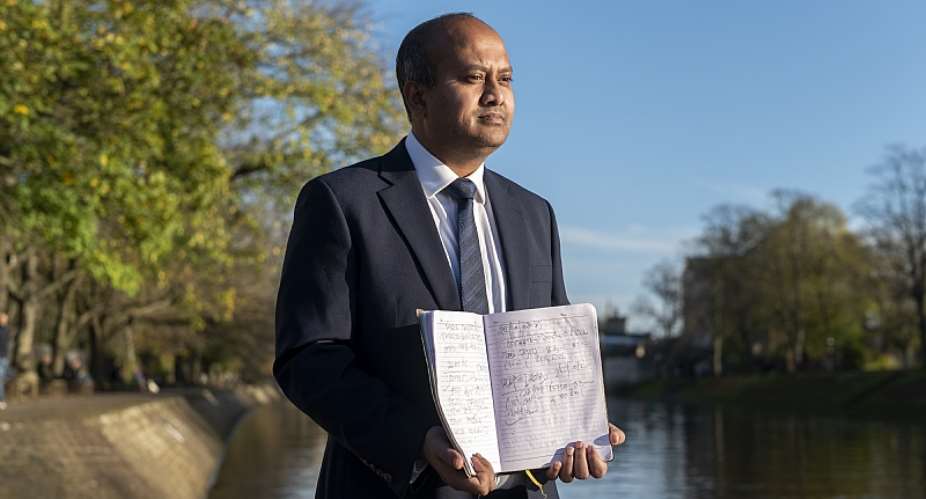Dhaka, Bangladesh - Renowned Bangladeshi author William Gomes is potentially facing charges under Section 21 of the Digital Security Act 2018, linked to his authorship of a contentious poem and his critique of Bangladesh's International Crimes Tribunal in an interview given to ABC Radio. If convicted, Gomes could face a prison term of up to 10 years and a substantial fine.
Section 21 of the Act enforces serious punishment for disseminating "propaganda and campaigns against the Liberation War of Bangladesh, the spirit of the Liberation War, or the Father of the Nation."
Gomes' poem, named "Anti-State" and published in the HuffPost, purportedly advocates for the burning of Bangladesh's red and green flag. This, coupled with his comments doubting the participation of Bangladeshi freedom fighters in war crimes during the 1971 war, have been mentioned in a police general diary as possible infringements of the Digital Security Act.
Regarding the issue, Gomes voiced his belief that his critique of the tribunal was rightful criticism. However, according to the Digital Security Act, the validity of such critiques could be disputable.
Following the publication of "Anti State" in 2012, Gomes' website (www.williamgomes.org) was blocked by the Bangladeshi government.
The incident serves to emphasise the ongoing debate over the interpretation and scope of the Digital Security Act. Critics claim the Act has the potential to limit freedom of speech and suppress government criticism, while supporters argue that it is crucial for the protection of national security and maintaining social order.
As of now, no formal charges have been levelled against Gomes. The case underscores the larger issues associated with the use of such legislation, and its potential impact on freedom of speech and political critique within Bangladesh.
Furthermore, Gomes has previously spoken out against extrajudicial killings and enforced disappearances carried out by the Rapid Action Battalion (RAB). His support for Shahidul Alam's release and the rights of Adilur Rahman Khan, among others, are well-documented. He believes his ongoing opposition to human rights violations, in conjunction with international sanctions against the Bangladeshi government, have placed him in the crosshairs of the authorities.
Since his self-imposed exile in 2011, Gomes perceives this latest development as an attempt by the Bangladeshi government, leading up to a general election, to suppress journalists living abroad who they perceive as threats or opposition. He also suspects that this general diary has been filed to deter him from critiquing the government in the run-up to and during the elections.
Gomes argues that Section 21 of the Digital Security Act 2018 is specifically designed to penalise and criminalise individuals like him and to stifle those who hold divergent views. His plea to Saima Wazed, Bangladeshi autism activist and daughter of Bangladesh's Prime Minister, Sheikh Hasina, for intervention, has been publicised on Twitter.
He urges Wazed to read his poem and convey its message to her mother, imploring her not to press charges and reminding her that writing a poem is not a crime.
However, Gomes further emphasised his vulnerability by expressing concerns that he may not be able to defend himself effectively, considering his inability to return safely to Bangladesh. He also pointed out the sensitivity of issues relating to the national flag and national history, which could discourage any lawyer from representing his case.
Moreover, Gomes raised the grim prospect of potential enforced disappearance upon his return to Bangladesh to face charges under the Digital Security Act 2018. He lamented that even while in exile, he is subjected to what he termed 'enforced censorship'.
This case once again brings to light concerns over the Digital Security Act, particularly Section 21. Critics fear that the legislation is structured in a way that potentially criminalises divergent views and penalises their propagators, thereby threatening the fundamental principle of freedom of speech.
The Bangladeshi authorities, however, are yet to officially charge Gomes. As this case unfolds, it is clear that it will continue to ignite debate and draw global attention to the legislation's impact on free speech, political critique and the broader human rights context within Bangladesh.





 We’ll no longer tolerate your empty, unwarranted attacks – TUC blasts Prof Adei
We’ll no longer tolerate your empty, unwarranted attacks – TUC blasts Prof Adei
 Bawumia donates GHc200,000 to support Madina fire victims
Bawumia donates GHc200,000 to support Madina fire victims
 IMF to disburse US$360million third tranche to Ghana without creditors MoU
IMF to disburse US$360million third tranche to Ghana without creditors MoU
 Truck owner share insights into train collision incident
Truck owner share insights into train collision incident
 Paramount chief of Bassare Traditional Area passes on
Paramount chief of Bassare Traditional Area passes on
 Two teachers in court over alleged illegal possession of BECE papers
Two teachers in court over alleged illegal possession of BECE papers
 Sunyani: Victim allegedly shot by traditional warriors appeals for justice
Sunyani: Victim allegedly shot by traditional warriors appeals for justice
 Mahama vows to scrap teacher licensure exams, review Free SHS policy
Mahama vows to scrap teacher licensure exams, review Free SHS policy
 Government will replace burnt Madina shops with a new three-story, 120-store fac...
Government will replace burnt Madina shops with a new three-story, 120-store fac...
